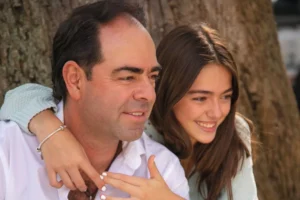It was a rare June day in Chicago — not too humid, fresh and balmy. At the farmer’s market, I filled every crevice of Anna’s stroller with leeks, carrots, tomatoes and peaches, and then schlepped my overloaded stroller to a friend’s house for lunch.
My friend’s husband Isaac made lasagna, which smelled wonderful. Two bites into my lasagna, however, my cell phone rang. When I saw the area code on my caller I.D. I knew that it could only be bad news — news I’d expected but hadn’t anticipated.
“Jenny, this is Father George calling from Portland. I want you to know that Fred coded this morning. He’s been resuscitated, but he is close to death.” I knew then that my 31-year-old godson Fred’s heart had stopped (and then started again) after his 10-year battle with AIDS.
“Can I, uh, talk to him?” I asked. Fr. George was quiet a moment.
“Jenny, Fred can’t talk anymore,” he said.
Death severs the dialog long before we’re ready to stop talking. Too often, we haven’t had a chance to say (and do) all that we intended. In Fred’s case, I should have called more, should have prayed more, should have sent more letters (and gift cards for Borders which he relished).
For weeks after his death, I berated myself for all I hadn’t done.
I had been warned. Two days before Fred died a doctor from the church had called because he was concerned about my plans to come out in August. He told me that if I wanted to see Fred alive I should come within two weeks.
As I agonized over the thought of a sudden trip, Fred, homeless and without any family save for his church and a few friends, was learning the news that he’d be wearing Depends for the rest of his (most likely short) life. His vital organs were shutting down, one by one, like lights in a theater, and he was preparing to leave the hospital and return to the hospice.
Sometimes our window of action is closing and we don’t even realize it. The doctor from my church was right when he told me that I might not be able to anticipate the grief and remorse I’d feel after Fred’s death. “These things look very different from the other side,” he said.
* * *
In one of my favorite scenes from the movie Simon Birch, tiny Simon, the inadvertent cause of his best friend’s mother’s death, walks onto a dock, raises both arms to the twilit sky and screams, “I’m sorry!”
After a death, we might need to say “I’m sorry” for the ways we failed that person back when the window was still open, but like Simon, our sorry is met with silence. We might ask ourselves if we had done something differently if we could have prevented the death, retracing our trail of breadcrumbs only to find that the bread has already been eaten: there is no way back.
After the tears, there is only an answerless silence to questions that may, in the end, be unanswerable. In A Grief Observed Lewis wrestled with these unanswerable questions:
“Can a mortal ask questions which God finds unanswerable? Quite easily, I should think. All nonsense questions are unanswerable. How many hours are there in a mile? Is yellow square or round? Probably half the questions we ask — half of our great theological and metaphysical problems — are like that.”
The questions we ask ourselves after a death are unanswerable because all we have (both to cope with and to own up to) are the things that actually did happen. Entertaining alternative possibilities doesn’t bring us any closer to healing, and might actually set us back. As long as we’re wishing for things to have gone a different way, we’re unable to get on with the work of integrating the knowledge of what actually did happen into our lives.
Like Lewis, we may not be able to resist unanswerable questions. Similarly, our questions might be colored by rage or disbelief or guilt. In A Grief Observed Lewis rages at God for offering him a marriage that was too sweet, too late, and too short. The more he screams and begs for answers, the more elusive they become. It’s only after his voice is sore from screaming and he’s exhausted every other possibility that he surrenders — not unlike a toddler crying himself to sleep.
“When I lay these questions before God I get no answer,” Lewis writes near the end of the book, “But a rather special sort of ‘no answer.’ It is not the locked door. It is more like a silent, certainly not uncompassionate gaze. As though He shook his head not in refusal but waving the question. Like, ‘Peace, child; you don’t understand.'”
* * *
And we don’t — perhaps sometimes we just can’t — understand. My own regrets about Fred have given way to gratitude for having known him and for the knowledge that he died surrounded by 20 people who stroked his pink and purple hair, patted his arms and feet and sung about Christ’s victory over death as he was weaned from the respirator. After he took his last breath they sang, “May the angels lead you into paradise.”
And I did, in the end, get a chance to say goodbye. A few hours before Fred died, I got a call. “Jenny,” my friend Barb said, “We want to let you say goodbye. Fred can’t speak, but we think he’s still here.” She held the phone to Fred’s ear and I told him that he was surrounded by people who loved him, that he could go in peace to God, that we loved him and were grateful to have known him.
There was silence on the other end of the line, but I felt heard. I had nothing more to say, so I just sat there with Fred for a few more minutes. I don’t know if that “conversation” helped Fred, but I know it helped me.
Two days after Fred died, my mom sent flowers for the garden — begonias, pansies, and petunias. They were, as chance would have it, pink and purple. As I packed the soil around their wispy roots, I thought of Fred, of things done and left undone. And I thought about letting forgiveness penetrate my own roots.
In the garden with my memories and regrets, the sun heavy on my shoulders I dedicated the flowers to Fred, homeless and AIDS-infected, a long way from his original home in Kentucky, lost to us, but found by God.
Copyright 2006 Jenny Schroedel. All rights reserved.










